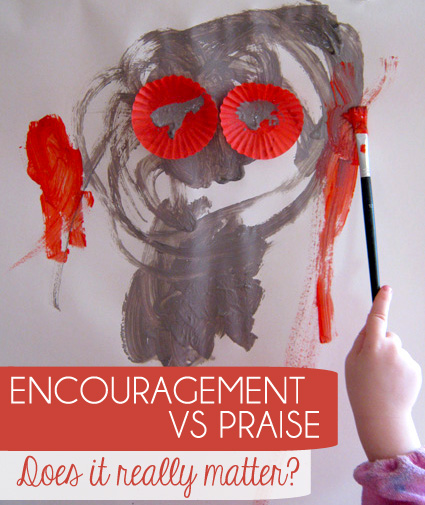Talking to Kids: Encouragement vs Praise
By Definition;
praise (prz), n.
1. Expression of approval, commendation, or admiration.
2. The extolling or exaltation of a deity, ruler, or hero.
3. Archaic A reason for praise; merit.
en·cour·age (n-kûrj, -kr-)
1. To inspire with hope, courage, or confidence; hearten.
2. To give support to; foster.
3. To stimulate; spur.
I believe the very definition of ‘encourage’ epitomises the roles of both parent and teacher – to inspire, courage, confidence, support, foster, stimulate, spur on. Contrast this with the words defining praise – approval, admiration, exalt, extol.
Whilst there is obviously a place for each when spending time with children, the difference is that encouragement acknowledges effort, the process and the celebration of success whilst praise makes a judgment and is about giving a child your approval of their actions.
Compare; “That is a beautiful painting,” with, “What bright colours you’ve chosen. What do you like most about your painting?”
Is it not more useful to say to the child – “Thanks for letting Joe play – it really cheered him up,” than “You’re a nice girl.”
It is important that we try to encourage and acknowledge much more regularly than we praise. We can do this simply by;
- Making a point of giving more specific feedback,
- Encourage effort, acknowledging success and failure,
- Focusing encouragement on the learning process and the child’s learning style.
You will find an excellent article from the New York Magazine about the inverse power of praise, including interesting results of recent research here: How Not to Talk to Your Kids: The Inverse Power of Praise By Po Bronson.


I always try to remember that praise is about the action, and encouragement is about the child.
What a cute twist putting up the definitions. Great idea.
Great post – I try to offer more encouragement than praise to my 2 year old, but it's tough! Your post gave me some good things to incorporate!
Excellent ideas! I am getting so much good info from your blog! Thanks!!!
A former early childhood educator turned parent hopping by…
This is a great encouragement post. I am a follower now.
I liked what you said about encouraging your children rather that praising their actions. I believe we are much more than what we "do" If who we are truly meant to be is encouraged from the outside, all the good inside will flow outward.
I stopped over here from this weeks blog hop. I wanted to say hello, so hello 🙂 Please stop by and meet me sometime.
Great post…so glad that I stopped by….I am going to follow your blog..
Thank you all for your comments, it is good to remind ourselves to encourage rather than praise.
Hope you checked out the link, it is a great article.
Christie
Fully agree; kids respond so well to comments and questions about their art rather than generic praise. They want to know that you are seeing their work, really seeing it.
Thanks for reposting this. I definitely agree and it’s good to have this reminder about how I can encourage my children.
Love this! I never thought to juxtapose the two words right next to each other like that. My parents are all about praise, and I’ve worked hard to learn to encourage my children instead. I can see the difference in their reactions, and how much they appreciate specific feedback.
Great that you reposted this. I didn’t know about you in 2009! Michael Gross defines these in pretty much the same way. I’ve been trying VERY hard to change the way I comment to our kids. I think we often default to praise because it’s much easier to comment on the end product than to stop and think about how to encourage their efforts. It takes lots of practice. One I often use now is, “What do you think?” It’s great because it’s encouraging them to appreciate their own efforts and not look for praise elsewhere. Thanks for the great reminder!
I don’t remember ever hearing someone say praise was harmful before today. When I first read it I thought “that’s messed up” because I didn’t understand. Thanks to their comments in your article I think I understand now. Recently I had a coworker that would make comments to me like “there goes the legend” or “how’s the best supervisor doing?” (I was his supervisor). He would say to the patients “You know you’re the most beautiful woman in the world?” & stuff like that. It annoyed me because I saw it as just straight up flattery & therefore insincere, not true. I even tried to ask him once, “What makes me a legend?” and all he had was “You just are.” I realize that we are all adults at work, but I think the same principle still applies. When I give positive feedback to my employees (I won’t call it praise now) I tend to give more concrete examples like “This is a difficult floor. I’m impressed that you are able to keep up with 50 patients and still get the filing done.” Or “I can tell you care about the residents and I appreciate that I can count on you to give quality care” I realize the 2nd statement was more generalized but it was still based on observations of that nurse’s performance and I just see it as so much more constructive than “You’re awesome” or “You’re the best.”